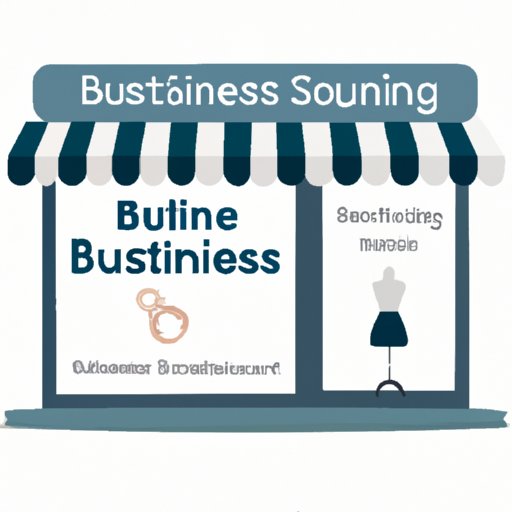Introduction
Do you have a passion for fashion and a head full of business ideas? Starting a boutique business can be an exciting and rewarding venture. But before you can open your doors, there are some important steps you need to take to make sure your business is successful. This article will provide a step-by-step guide to help you get started.
Overview of the Problem
If you’ve ever dreamed of owning your own boutique, you know it takes more than just a great sense of style to make it a success. You need to have a clear understanding of the market, a solid business plan, and the right sources of financing. It also helps to have a good grasp of the legal requirements involved in setting up a business.
Purpose of the Article
The purpose of this article is to provide an overview of the steps you need to take to start a successful boutique business. We’ll discuss how to outline your business plan, research the market and identify your target customers, establish a legal structure for your business, secure financing, source products, and create an online presence.
Outline Your Boutique Business Plan
Before you can open your business, you need to create a business plan that outlines your goals and objectives. A business plan will help you stay focused on the big picture and keep you on track as you move forward. Here are some key points to consider when creating your plan:
Define Your Goals
What do you want to achieve with your boutique business? Do you want to be the go-to store for a certain type of clothing or accessory? Are you looking to build a successful online presence? Setting specific goals and objectives will help you focus your efforts and measure your success.
Identify Your Target Market
Who is your ideal customer? Knowing who you are targeting is essential for developing your marketing strategy and sourcing the right products. Take some time to research your target demographic and understand their needs and preferences.
Determine Your Unique Selling Proposition
What makes your boutique different from the rest? What value do you offer that your competitors don’t? Having a unique selling proposition (USP) will help you stand out from the competition and attract more customers. Your USP should be clearly articulated in your business plan.
Create Your Business Plan
Once you have determined your goals, identified your target market, and developed your USP, you can begin putting together your business plan. Your plan should include an executive summary, a description of your product or service, a market analysis, a financial plan, and a marketing strategy. There are many resources available to help you create a comprehensive business plan.

Research the Market and Identify Your Target Customers
Once you have outlined your business plan, it’s time to start researching the market and identifying your target customers. Knowing who your competitors are and understanding your target customer base will help you develop an effective marketing strategy.
Identify Your Competitors
Take some time to research the competition. Find out what they are offering and identify any gaps in the market. Knowing who your competitors are and what they are doing will help you determine where to position your business.
Analyze Your Target Customer Base
Understanding your target customer base is essential for developing an effective marketing strategy. Research your target demographic and analyze their buying habits and preferences. Use surveys, focus groups, and other methods to gain insights into their behavior.
Develop a Marketing Strategy
Your marketing strategy should be tailored to your target customers. Develop a plan that includes both traditional and digital marketing tactics. Utilize print advertising, direct mail, email campaigns, social media, SEO, and other methods to reach your audience.

Establish a Legal Structure for Your Boutique Business
Before you can open your business, you need to establish a legal structure. The most common structures are sole proprietorship, partnership, limited liability company (LLC), and corporation. Each has its own advantages and disadvantages, so it’s important to do your research and choose the right one for your business.
Choose a Business Name
Choosing the right name for your business is essential. It should reflect the nature of your business and be easy to remember. Make sure your desired name isn’t already taken and check to see if it’s available as a domain name.
Register Your Business
Once you have chosen a name for your business, you need to register it. Depending on your state, you may need to register with the Secretary of State or Department of Revenue. You may also need to obtain an Employer Identification Number (EIN).
Obtain Required Licenses and Permits
Depending on where you live, you may need to obtain certain licenses and permits before you can open your business. These can include a general business license, a retail sales tax permit, and a zoning permit. Check with your local government to determine which licenses and permits you need.

Secure Financing for Your Boutique Business
Securing financing can be one of the biggest challenges when starting a business. You need to make sure you have enough money to cover the initial costs and ongoing expenses. Here are some tips for securing financing:
Consider Different Funding Options
There are various ways to finance your business. You can apply for a loan from a bank or credit union, seek venture capital, or use crowdfunding sites like Kickstarter or Indiegogo. Consider all of your options and choose the one that best fits your needs.
Prepare Your Financial Statements
In order to secure financing, you need to prepare your financial statements. This includes a balance sheet, income statement, cash flow statement, and statement of changes in equity. These documents provide lenders and investors with an overview of your financial health.
Source Products for Your Boutique Business
Once you have secured financing and established a legal structure for your business, you need to find suppliers for your products. Finding the right suppliers can be a time-consuming process, but it’s essential to ensure you have quality products at competitive prices.
Research Suppliers
It’s important to research potential suppliers to make sure they are reputable and reliable. Ask for references and read reviews. You should also compare prices and shipping terms to make sure you’re getting the best deal.
Negotiate Prices and Shipping Terms
Once you’ve found a few potential suppliers, negotiate prices and shipping terms. Don’t be afraid to ask for discounts or free shipping. Negotiating can save you money and help you remain profitable.
Create an Online Presence for Your Boutique Business
Having an online presence is essential for any modern business. Creating an online store, utilizing social media platforms, and optimizing your website for search engines can help you reach more customers and increase your sales.
Establish an Online Storefront
Creating an online store is a great way to expand your reach and boost sales. You can use an ecommerce platform such as Shopify or WooCommerce to set up an online store quickly and easily.
Utilize Social Media Platforms
Social media is a powerful tool for connecting with customers and promoting your business. Create accounts on popular platforms such as Facebook, Twitter, and Instagram and post regularly to engage with your followers.
Optimize Your Website for Search Engines
Search engine optimization (SEO) is essential for increasing your visibility in search engine results. Use keywords in your content and optimize your pages for mobile devices. Utilizing SEO best practices will help you attract more customers.
Conclusion
Starting a boutique business can be a challenging and rewarding venture. By following the steps outlined in this article, you can turn your dream into reality. Outline your business plan, research the market and identify your target customers, establish a legal structure for your business, secure financing, source products, and create an online presence. With the right plan and dedication, you can succeed in your venture.
Summary of Steps
To start a successful boutique business, you need to outline your business plan, research the market and identify your target customers, establish a legal structure for your business, secure financing, source products, and create an online presence.
Benefits of Starting a Boutique Business
Starting a boutique business can be a gratifying experience. You can pursue your passion, build a successful business, and make a positive difference in people’s lives. Taking the right steps and having a clear plan can help you achieve your goals.
(Note: Is this article not meeting your expectations? Do you have knowledge or insights to share? Unlock new opportunities and expand your reach by joining our authors team. Click Registration to join us and share your expertise with our readers.)
